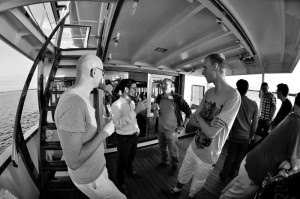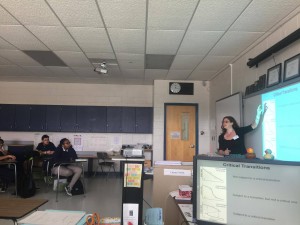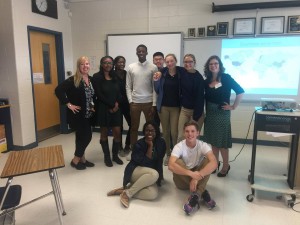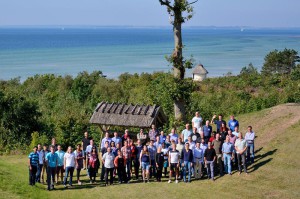The final CRITICS Winter Workshop will take place at Imperial College London, London, UK, during 25-29 March 2019. The programme and details are available here.
4th Workshop and Winter School
We cordially invite you to participate in the 4th CRITICS Workshop and Winter School on “Critical Transitions in Complex Systems: Mathematical theory and applications” held in Wöltingerode, Germany, March 5-16, 2018.
This event is part of the activities of the ITN network CRITICS (http://www.criticsitn.eu) bringing together scientists in mathematics and applications on progressing the understanding of critical transitions in complex systems ranging from ecology and climate to economic theory.
Winter School, March 5-9, 2018
The meeting starts with a 5-day winter school for doctoral students, young researchers, and interested senior researchers. It consists of three courses featuring lectures and tutorials.
Slow-fast systems
Christian Kühn (Technische Universität München)
Equation-free approaches for complex systems
Jens Starke (Universität Rostock)
Numerical methods for stochastic processes
Kathrin Padberg-Gehle (Leuphana Universität Lüneburg)
More information on the doctoral school will be provided here shortly.
Workshop, March 12-16, 2018
The list of invited speakers will be published here by the end of December 2017.
Venue
Klosterhotel Wöltingerode (http://klosterhotel-woeltingerode.de), Goslar, Germany.
Registration
Deadline for registration: January 31, 2018
How to register: Please send an email with the following information to the organizing committee at critics2018@uni-jena.de:
-
NAME
-
AFFILIATION
-
POSTAL ADDRESS
-
ARRIVAL AND DEPARTURE DATES
-
INTEREST TO GIVE A TALK (YES/NO); TITLE AND ABSTRACT
Registration fees:
Winter School€ 900
(arrival Sunday, March 4, 2018 — departure Saturday, March 10, 2018)
Workshop € 900
(arrival Sunday, March 11, 2018 — departure Saturday, March 17, 2018)
Winter School & Workshop €1450
(arrival Sunday, March 4, 2018 — departure Saturday, March 17, 2018)
The registration fee covers participation in the scientific and non-scientific program as well as single room and board at the Klosterhotel Wöltingerode.
Committees
Scientific committee
Michael Dellnitz (Universität Paderborn)
Ulrike Feudel (Carl von Ossietzky Universität Oldenburg)
Jeroen Lamb (Imperial College London)
Ilya Pavlyukevich (Friedrich Schiller Universität Jena)
Egbert van Nes (Wageningen University & Research)
Organizing committee
Gabriel Fuhrmann (Friedrich Schiller Universität Jena)
Tobias Jäger (Friedrich Schiller Universität Jena)
Moussa Ndour (Technische Universität Dresden)
Kathrin Padberg-Gehle (Leuphana Universität Lüneburg)
Flavia Remo (Friedrich Schiller Universität Jena)
Contact: critics2018@uni-jena.de
Outreach in New Jersey
On 7 June 2017 Courtney Quinn returned to her alma mater, Winslow Township High School (Atco, NJ, USA), to discuss with the students what she had been up to in the 8 years since her graduation. Courtney primarily focused on her work with the CRITICS ITN. Her host was none other than her own Honors Trigonometry teacher from 11th grade. Courtney spoke to seven different mathematics classes that day, ranging from Advanced Placement Statistics to College Preparatory Pre-calculus.
There were two main aims of her outreach. The first was to bring attention to the type of research we do, namely “critical transitions”. Courtney not only discussed the mathematics behind our work, but also the widespread applications it has in the real world. The impact of mathematics is not always understood at the high school level, so it is important that students see how essential it is within all of the sciences. The second aim was to introduce the idea of having a career in research and what life is like for a researcher. Finally, Courtney shared some inspirational quotes from other CRITICS ESRs about how they felt leaving high school and why they eventually decided to go into research. The students were very interested in the stories of the other researchers and how our network has united people from all over the world.
Special thanks go to Chantel Smith for arranging Courtney’s visit that day.
Report on 1st CRITICS Workshop in Kulhuse, Denmark
The mesmerising view of the glimmering sea from the seminar room could easily have ruined the workshop by stealing the attention from the participants. Luckily, the science at the first CRITICS Workshop in Kulhuse, Denmark 4 – 9 September 2016 was engaging enough to keep the participants focussed (most of the time).
An outside observer might have wondered what could have brought 70 participants from all across the world and from disciplines as diverse as sociology, ecology and pure mathematics together. The answer and binding glue is “Critical transitions in complex systems”. There is still a long way to understanding sudden and significant changes to highly nonlinear systems in nature, which requires both an applied and theoretical point of view.
Most of the workshop was in the form of talks, with ample of time for discussion. There was a mixture of regular 20-minutes contributed talks and 45-minutes talks from invited speakers divided into themed sessions lasting one quarter to a full day.
Henk Dijkstra opened the Monday session with a talk on collapse of the Atlantic Meridional Overturning Circulation. Three climate-related talks on rapid loss of Arctic sea ice, abrupt changes in marine ice sheets and see-saw like behaviour of monsoon proxies followed.
After lunch Egbert van Nes gave an overview of applications of early warning signals ranging from marine ecology to balance in humans, after which Martin Rypdal talked about early warnings in systems with many characteristic time scales.
The second half of Monday afternoon was devoted to posters. Those who had brought posters gave two-minute pitches for their posters and then discussions about the posters followed.
Tuesday morning saw a continuation of the climate theme. Several talks concerned prediction and identification of abrupt events in time series. The exception was Peter Imkeller, who talked about estimating coefficients and comparing paleoclimatic models with alpha-stable and fractional noise.
Thereafter, the group got a taste of Danish history when paying a visit to the Viking ship museum and cathedral in the town of Roskilde. In the night, there was a much appreciated dinner at an old wood-decked boat cruising the picturesque Roskilde fjord.

Engaging conversation on the fjord. From left to right: Manfred Mudelsee, Iacopo Longo, Ilya Pavlyukevich, Kevin Bulthuis, Usman Mirza, Pablo Rodriguez Sánchez, Sebastian Bathiany and Ismael Maroto Camarena.
Wednesday morning marked a critical transition, with an abrupt increase in the purity of the mathematics. Martin Rasmussen opened with a talk about bifurcations of set-valued and random dynamical systems, after which more talks on bifurcations in random and nonautonomous dynamical systems followed. In the afternoon, Anna Maria Cherubini talked about stochastic resonance in periodically forced dynamical systems.
Having digested a lot of heavy mathematics, the less purely mathematically oriented participants found respite in a series of climate talks before dinner. Unlike the previous days, those talks were not directly focussed on time series.
Later that night, Michael Hartl and Courtney Quinn arranged a Jeopardy quiz with topics such as “Pokémon”, “Tri-bond” and “From C to shining C”. Jeroen Lamb’s team won, after their closest competitors had bet all their points on the final question seeking the name of a certain Danish queen, and failed.
With fresh minds on Thursday morning, the audience was ready to learn about new results on non-autonomous differential equations from the University of Valladolid group. Ismael Maroto Camarena and Iacopo Longo gave accessible and much appreciated talks on exponential stability for functional state dependent delay equations and equations of Carathéodory type respectively.
Thursday afternoon saw a gradual increase toward applications, with Anthony Quas giving a talk on impediments to mixing in forced dynamical systems and Mary Silber presenting models and data of vegetation patterns in the Horn of Africa. Keith Briggs, currently in the communications industry, introduced himself with a historical note on the influence of Danish on place names in England. On the mathematics side, he presented a colouring problem arising from local bandwidth considerations in communication networks.
Friday, the final day of the workshop, was on the theme of critical transitions. In particular rate induced transitions and critical transitions in spatially extended multiscale systems were brought up. Jeroen Lamb closed the workshop with a talk about additive noise destroying the pitchfork bifurcation, and a concluding thank you speech to all participants and speakers of the workshop.
The first CRITICS workshop on Critical Transitions in Complex Systems was organised by Jeroen Lamb of Imperial College London, Jan Sieber of the University of Exeter, and Peter Ditlevsen of the University of Copenhagen, all part of the European Union Marie Skłodowska Curie Actions CRITICS. Peter Ditlevsen, Johannes Lohmann and Karl Nyman were local organisers.
We apologise to everyone who was not explicitly mentioned in this summary, and refer those interested to the full programme.
Karl Nyman, (photos: Iacopo Longo).



